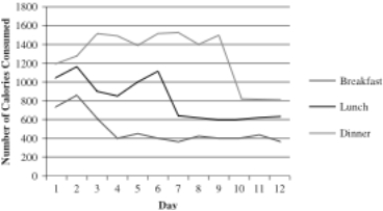Multiple Choice
Dr. Anderson is a nutritionist who helps clients lose weight prior to surgery. She is working with W. J., a male client who is planning on undergoing a heart transplant. He currently eats more than 3,500 calories a day and has been asked by his doctor to cut the number of calories to about 1,800 (400 for breakfast, 600 for lunch, and 800 for dinner) . She is curious as to whether a food journal will help W. J. reduce the number of calories he eats. A food journal is used to record everything a person eats to help patients be more aware of what they're eating. W. J.'s wife also recorded the food he consumed at each meal to have complete data before introducing the journal. Dr. Anderson decides to phase in the food journal gradually, initially only having W. J. record what he ate at breakfast during the first three days after baseline (days 4-6) . During days 7-9, the journal is used at lunch, too, and during days 10-12, it also is used during dinner. The data for Dr. Anderson's study are below.
Which of the following is evidence that would allow Dr. Anderson to conclude that keeping a food journal caused weight loss in W. J.?
A) Lunch calories decreased on Day 3.
B) Breakfast calories decreased on Day 2.
C) Dinner calories decreased on Day 10.
D) Calorie intakes for the three meals differed on Day 1.
Correct Answer:

Verified
Correct Answer:
Verified
Q51: Dr. Fletcher is interested in understanding whether
Q52: Dr. Fletcher is interested in understanding whether
Q53: Which of the following is an advantage
Q54: Explain how interrogating the statistical validity of
Q55: Why do quasi-experiments tend to have very
Q57: Dr. Fletcher is interested in whether joining
Q58: Dr. LaGuardia is a cognitive neuroscientist who
Q59: Dr. LaGuardia is a cognitive neuroscientist who
Q60: In which of the following ways are
Q61: Which of the following is a difference